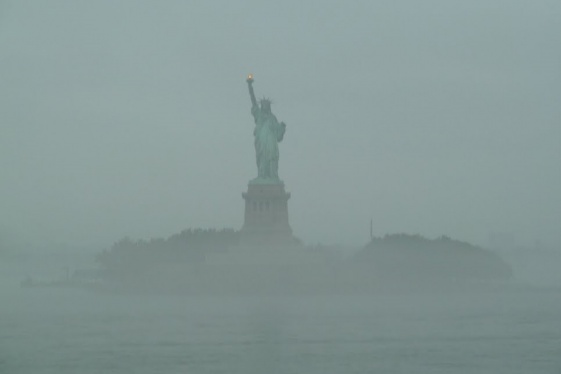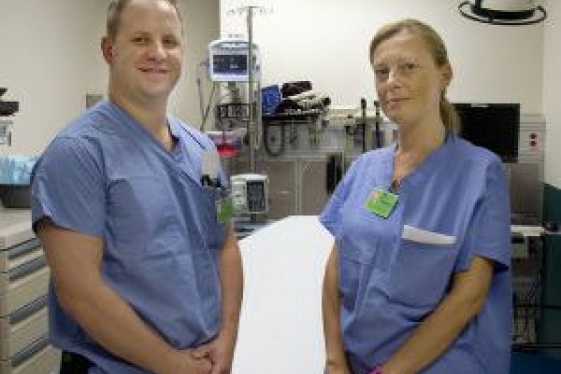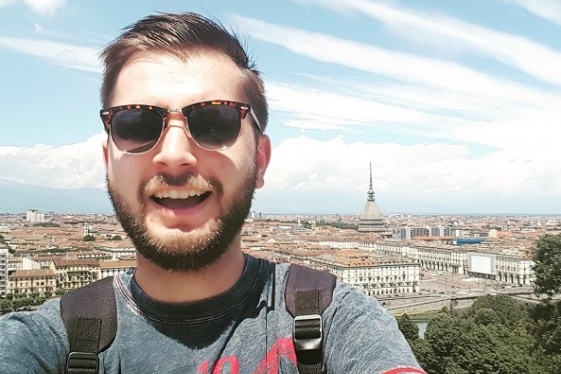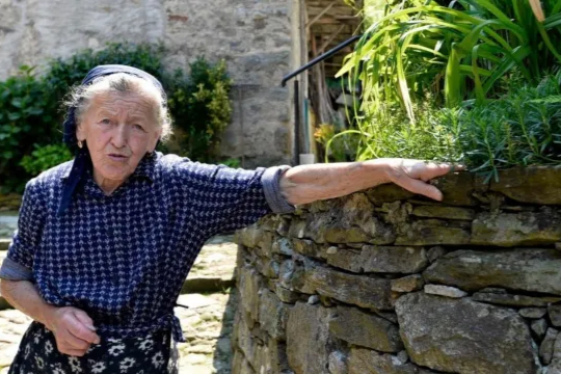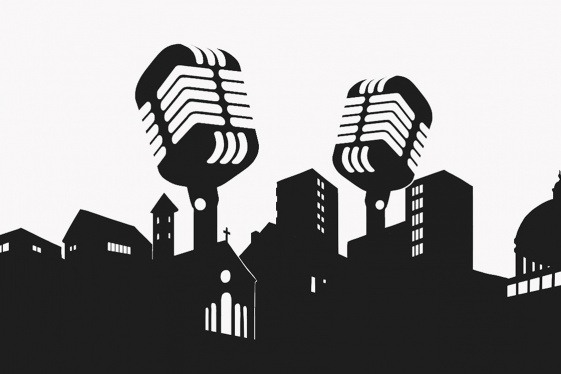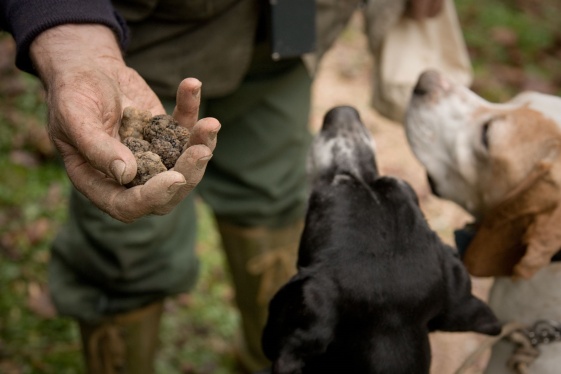
Andrea Gastaldo (Foreign Policy Advisor to U.S. Army North)
Memorial Day: un ricordo italoamericano

Memorial Day is approaching once again, and this year it brings a special interview, for me. As some of you know, one of the reasons I'm so in love with and grateful to the United States is that during WW2 my father, Teodoro "Rino" Mucci, was saved by the American soldiers of the Fifth Army, in the Northern part of Italy. He certainly would have been killed by the Fascists without them.
Among those soldiers, in the Fifth Army, many were Italian Americans. And among those who saved my father, I've grown up knowing these three names, who have always been for me the representatives of those who saved my father, and allowed me to even exist. Those three names are Salvatore "Sal" Di Marco, Anthony "Tony" Tiso and Edward "Eddie" Gastaldo. My Italian American heroes, who remained friends with my father even after the war.
This year marks the 75th anniversary of the Fifth Army, which began U.S. Army North in 2004. A ceremony was held last January: Andrea Gastaldo, the Foreign Policy Advisor to U.S. Army North, daughter of Eddie Gastaldo, attended the ceremony. She's with us, today: I personally thank her for telling us something about the Fifth Army and some of those brave Italian American heroes who saved my father and freed Italy. I also thank her for her service and, through her, every American soldier, specifically those who came across the ocean to liberate Italy, and more specifically the Italian American ones. I will never forget. We the Italians will never forget.
Andrea, you are the foreign Policy Advisor to U.S. Army North. Please tell us something about you
I am a Foreign Service Officer, I work for the Department State, and when I am overseas, I work as a Diplomat, which means I represent the President, the Government, and the People of the United States as a part of the Executive Branch. I recently just finished my 20th anniversary from when I started and now I am the Foreign Policy Advisor to Army North, which means that I advise the Lieutenant General on policies that will impact our Nation.
You are the daughter of Maj. Edward “Eddie” Gastaldo, an Italian American who fought behind enemy lines as an intelligence officer for Fifth Army headquarters. Please tell us about your father and his service
My father was actually chosen to go into the military before Pearl Harbor, and then he was chosen, due to his language skill, to go to a special language school, in Georgia I believe, where a group of Italian American men were trained to speak Roman Italian, not dialect. So this group of Italian American soldiers was specifically trained to be used for interrogations and intelligence purposes when the American forces made it to Italy.
So they trained up, and then they were moved to North Africa where the Fifth Army actually began on January Fifth of 1943. Then they were moved from North Africa to Sicily. My father did not move with the American troops, but he was actually detailed to the British in a special operation. So he was with the British, then moved forward, and then he met up, I believe, with Tony Tiso and Sal Di Marco, his two compatriots, near Salerno: and then they were in Salerno and moved behind the enemy line when the rest of the troops moved to Rome. My father, Tony, and Sal then worked with the Partigiani behind enemy lines but still reporting back to the main Army elements. He made his way all through Italy and his military intelligence group was near Milano when the end came for Mussolini.
My father’s family was from a small town about 20 miles fromIvrea, in Piemonte: his father was from Tina, while his mother was from outside Asti, so both of the sides of the family were from Piemonte. He lost his father very early, when my father was 15, but my grandmother, nonna Adelina, brought my father and his brother Frank to Italy, to meet the family after her husband, my grandfather, died. So he had a connection there, he knew where his family was and during the War he went to see how they were doing. My father is actually still very well-known in the town, because he showed up one day, I believe in 1944, with a jeep filled with chocolates for the children, blankets, and pantyhose for the women.
And then my father after Italy was in Austria, at the end of the War, working as a Department of the Defense Civilian for a short time before he returned to the US.
Is there an anecdote or a particular memory about your father during the years of the war you would like to share with us?
One day my father and Tony Tiso were out driving around: they had a jeep called "The Mary Jane" named after an ex-girlfriend of my father! So they had spotted a German motorcycle near a farmhouse, somewhere in north of Italy, and they realized there was a German soldier inside the farmhouse. My father decided they should steal the motorcycle, because it wasn't supposed to be there, so he and Tony Tiso went, and they took the motorcycle and rolled it away from the farmhouse. And then my father asked to Tony Tiso "Can you ride it?" and Tony Tiso said "No, I don't know how to ride a motorcycle, I thought you know how to ride a motorcycle!"
So neither one of them knew, but my father let Tony Tiso try, and he obviously couldn't drive it; so my father had to ride it, but Tony Tiso had left the clutch in. When my father started it, the motorcycle shot out, and he started riding uncontrollably on one of these hills, and he crashed it. So Tony Tiso ran up to him and said "Oh my God, Eddie what have you done!"
My father was bleeding from his head, and his elbow was broken, so he asked Tony "Please, take the letter out of my pocket!" Now, you have to know that it was very common for soldiers in war to have a letter for their mother, their loved one, ready in case they died. He said: "Please, give it to my mother, but tell her I died in combat!" Then my father went to the hospital. Tony went to see him two days later and my father asked him "Oh, Tony, tell me you haven't sent that letter!", and Tony said "No!" and gave it back to him. At the end they had to remove my father’s funny bone, and he had a big scar on his head. I don't know what story they gave to their officers, but the German had to explain the loss of his motorcycle after that!
This year marks the 75th anniversary of the Fifth army, which in 2004 has become U.S. Army North: please tell our readers about the story of this courageous group of American soldiers, and about its role nowadays
The Fifth Army, as I said before, began in North Africa with the specific intent to go first in Sicily and then move in Italy to secure Italy from Mussolini. During the movement between Africa and Sicily and then the whole Italy, the Fifth Army had 65 Medals of Honor Winners, which is a tremendous number, a tremendous amount of bravery and courage. They landed near Salerno and it was a very difficult landing, because of the location. The purpose was to go across Italy, to go up and try to secure the country. They had people from all over the country and from all the background. They had Native Americans, African Americans, Irish Americans, Italian Americans, Jewish Americans, they had all different types of soldiers, and all of them worked together with this common goal.
After the War, obviously all the Armies were reassessed: the Fifth Army and the Fourth Army were consolidated together. Then the Fifth Army was reactivated as Army North, specifically after September 2001. Army North's missions right now are Homeland Defense, Defense Support to Civil Authorities (in case of a natural disaster or an attack on U.S. soil), and then it also coordinates Security Cooperation with Mexico, Canada, and the Bahamas.
The Italian Americans in the army have always been a valiant, numerous group, which you represent now here with us. During WW2 many of them, like your father, decided to help save Italy, their motherland, while fighting for the Americans…
I don't know all the stories: not many Italians who had emigrated to the United States were able to go back and forth once they came, because it was very expensive and difficult. They stayed in the United States for long time before they were able to come back to their Motherland.
For my father, it was different, and unusual: he knew where his family was, he knew where they were from, and he knew the difficulties of the family. He was a proud American, but he always believed that should know where you are from and stay in touch with family. He thought it very was important to continue learning and being educated about Italy: he never stopped learning about Italy, whether it was about the Italy of his war years or going back in time to the Renaissance or even to the beginning of the Christianity. So, even as a new soldier, he probably had more background and understanding about Italy and the differences between its Regions and between the dialects, than the other soldiers and friends. That's why he used a different approach: to him, to help Italy was to help America, because when you worry about your family back home, you can't really take care of your family in front of you. He stayed in touch, for the rest of his life, with his uncles, aunts, and cousins, as well as the Italian friends he made during the war, to include your father Rino Mucci.
In a few days America will celebrate Memorial Day. What does this historical day mean for you?
For me the Memorial Day is the day that we think of all the sacrifices that all the Americans have made for us in every War, every conflict.
I think "What have we done to honor the dead, by making sure we make the right decision if we have to go to war again?" Because when you go to war, it's the ultimate decision of risk, you put yourself at risk and you put your family at risk and your countrymen and countrywomen at risk. I served in war, in Iraq in 2006/2007. I left my children in Kuwait with their father; I was at war, under attack, as a diplomat. So, when you do that, you really consider "Why are we here? Is this going to help?" because you don't want to return to the same place and do it again and again and again. You'd like to have a solution that helps to shape a peaceful future and avoid the country going to war again.
So that's really what I think about Memorial Day: I think about all the lives we lost, everywhere, especially stories of ones less known or battles less famous. Most of the times we lose our soldiers with little glory, with few newspaper articles, or very little news, or we don't even know their names when they fall (die). And those are the ones we have to remember, that we do the right thing by honoring what they did and taking time to recognize their sacrifice.
As an Italian American, what are your feelings about Italy?
I love Italy, of course! I will tell you an interesting story: there are six Andrea Gastaldo on Facebook, but all of them are Italian men except me! I'm the only female and I'm the only American, but I have strong affinity for Italy. My father chose my name as he wanted me to have a name that was a strong name, but also a name from Italy. I've done the same with my daughters, and they have very Italian names, Francesca and Gabriella!
We visit our family in Italy, in Piemonte, and we have also cousins in Rome. We try to remember where we are from: I think that when you remember where you are from, you remember where you can go. So we love Italy, we love travelling in Italy, we love the people, and we love the traditions. We'll always love Italy!
You may be interested
-
'America: Promised Land' reveals how immigran...
The subject of immigration has always been a hot political topic in the United States. The...
-
'Fantastic' exchange thrills Italian doctor,...
Two doctors on opposite sides of the Atlantic Ocean have set up their own international ex...
-
'Italians always make you feel welcome - acco...
The Italian language has had more of an impact on me than anything else in my life so far....
-
'The Soul of Barolo' Wins Wine Spectator’s 20...
On a summer trip to Piedmont in Italy, Seattle-based filmmaker Will Miceli fell in love wi...
-
'Truffle tourism' worth 63 million euros in I...
Truffle fairs and truffle hunting tours have attracted some 120,000 visitors to Italy this...
-
‘Leave our granny alone!’ Family of 97-year-o...
Paolina Grassi, 97, is the sole inhabitant of an abandoned Alpine hamlet in northern Italy...
-
‘Music and the Cities’ podcast
"When the silence in the streets may seem deafening, music continues to dictate trends and...
-
‘The Mozart of fungi’: For ages, truffle hunt...
The prized Italian white truffle continues to shatter records. This precious fungus—nickna...













